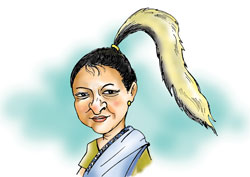|
|
Prime Minister Girija Prasad Koirala must have been aware that the appointment of Sujata Koirala as de facto deputy prime minister was unlikely to go down well in his own party, let alone with his coalition partners in the seven-party alliance. Clearly it was a considered risk. Perhaps there is something he wants done that he can only entrust to his daughter.
It is equally unlikely that minister without portfolio Sujata Koirala didn't consider the anger her remarks about the monarchy and the 1990 constitution would create. She carefully calculated the likely repercussions of her seemingly intemperate observations and decided to court controversy anyway. Obviously, to her, the political stakes are high enough to warrant the irrational advocacy of such an irrelevant, unpopular institution.
The rumour mill has begun working overtime, and almost everyone has a conspiracy theory to explain the weird ways of the Koiralas. Some believe papa feels honour-bound to protect the monarchy and wants his daughter close so she can advance his agenda. Others even believe Sujata wants to be queen herself.
Remnants of the royal regime contend that the prime minister has consented to support a military-backed civilian government headed by his daughter if the scheduled elections fail to take place again. Such a step would confer ex post facto legitimacy on the 'doctrine of necessity' that King Gyanendra used to usurp all constitutional authority. Royalists hope the amity between the Shahs and Koiralas would enable the constitutional monarchy to reign supreme once more.
Leftists are more cynical. They believe Koirala will use his daughter to bully, bribe and bamboozle various insurgent groups in the tarai to make them fall into line for the elections. Mission accomplished, Sujata will be told to fend for herself in the cutthroat battle for the NC leadership. This is the reason kangresi stalwarts have been rather muted in censuring Girija's decision and Sujata's statements.
The prime minister is, after all, accomplished in the political art of use and discard. Shailaja Acharya tried to reconcile her private monarchism with the public republicanism of Uncle Koirala. Clan membership has its advantages, but the cost of belonging can also be high. Just ask Shashank Koirala. He used to be a top-notch ophthalmologist with a significant presence and a respected voice in public life. Now he is a marginal participant in his party's internal power games.
Addressing the women's wing of NC on the last day of 2007, Girija assured his audience the country would soon see a female prime minister. It wouldn't be a day too soon for Nepal if his predictions were to come true: Bangladesh, India, Pakistan and Sri Lanka have all had women presidents or premiers. But it's a little premature to connect Koirala's wishes and his actions. Sujata may already be a grandmother, but in the political school of hard knocks she is no match for Sher Bahadur Deuba or Sushil Koirala.
That is not to say that Nepal is not ready to accept a female head of state or government. Far from it: Nepali women have earned the right to lead this nation by their grit and determination rather than by relying on the will of a patriarch. There is no dearth of competent and committed women who could lead Nepal.
With her professional qualifications and long history of political struggle, Hisila Yami would have been the ideal candidate. But she is in the wrong party: male domination in Marxist and Maoist parties does not allow women to rise beyond a certain level in power politics. A democratic framework is the sine qua non for gender justice.
Chitralekha Yadav could have been another contender, but there is no shortage of pretenders to the leadership throne in her party. To improve her chances, she should look at the possibility of jumping on the Mahanta Thakur bandwagon.
Sujata's critics-and there are many-may not like it, but if she can refrain from spoiling her chances further by not associating herself too closely with the monarchy, she may yet emerge at the top of the heap to claim her father's crown. The royal dynasty may be sidelined, but long live the democratic dynasty.




